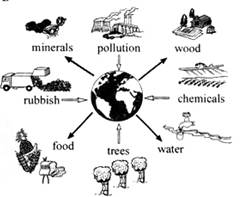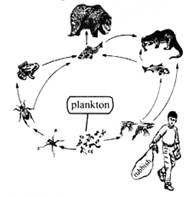
题目列表(包括答案和解析)

The population of the Earth is growing faster. It is important that we look after the Earth. We need it!
The Earth gives us a lot of things. We also give the Earth a lot, but some of the things are not good.
In nature, when something dies, other animals and plants get food from it. Every animal or plant gives food for other animals or plants. However, animals can’t get food from many of the things that we ‘give’ the Earth. Animals and plants can’t eat metal, plastic and glass. These things will stay in the ground for many, many years.
Some rubbish is very dangerous for plants and animals. In some places, many animals live together. One animal makes food for many more animals. If we put rubbish and chemicals in the water, the plankton(浮游生物) can die. If there isn’t any plankton, many animals have nothing to eat.
So what can we do? Don’t leave any rubbish in the countryside! Don’t make so much rubbish!
【小题1】The Earth gives us ___________.
| A.food | B.rubbish | C.chemicals | D.pollution |
| A.water and grass are polluted |
| B.plastic and wood become food |
| C.other animals and plants get food |
| D.metal and glass stay in the ground |
| A.put metal in the ground | B.use more wood |
| C.keep frogs in the water | D.make less rubbish |
句型转换
【小题1】 The earth is big, but the sun is much bigger.(改为同义句)
_____________________________________________________
【小题2】 We are both good students.(改为同义句)
_____________________________________________________
【小题3】 We often go hiking in May(对画线部分提问)
_____________________________________________________
【小题4】I think Lesson 10 is more interesting.(改为否定句)
_____________________________________________________
【小题5】 I sleep nine hours every night.(对画线部分提问)
_____________________________________________________

The population of the Earth is growing faster. It is important that we look after the Earth. We need it!
The Earth gives us a lot of things. We also give the Earth a lot, but some of the things are not good.
In nature, when something dies, other animals and plants get food from it. Every animal or plant gives food for other animals or plants. However, animals can’t get food from many of the things that we ‘give’ the Earth. Animals and plants can’t eat metal, plastic and glass. These things will stay in the ground for many, many years.

Some rubbish is very dangerous for plants and animals. In some places, many animals live together. One animal makes food for many more animals. If we put rubbish and chemicals in the water, the plankton(浮游生物) can die. If there isn’t any plankton, many animals have nothing to eat.
So what can we do? Don’t leave any rubbish in the countryside! Don’t make so much rubbish!
1. The Earth gives us ___________.
A. food B. rubbish C. chemicals D. pollution
2.When something dies in nature, _________.
A. water and grass are polluted B. plastic and wood become food
C. other animals and plants get food D. metal and glass stay in the ground
3.We must _______ to look after the Earth.
A. put metal in the ground B. use more wood
C. keep frogs in the water D. make less rubbish
书面表达(共15分)
某调查组到社会上进行调查环境污染的问题,设计了下列调查表.。
| kinds of pollution | There are many kinds of pollution around us such as _air pollution, _water_ __ pollution, __noise/white__ pollution and rubbish pollution. |
| results | The environment on the _earth_ is becoming worse and _worse_ . |
The word “day” has two meanings. When we talk about the number of days in a year, we are using “day” to mean 24 hours. But when we talk about day and night, we are using “day” to mean the time between sunrise and sunset. Since the earth looks like a ball, the sun can shine on only half of it at a time. Always one half of the earth is having day and the other half night. A place is moved from day into night and from night into day over and over by the spinning(旋转)of the earth. At the equator(赤道)day and night are sometimes the same length(长度). They are each twelve hours long. The sun rises at 6 o’clock in the morning and sets at 6 o’clock in the evening. For six months the North Pole is tilted(倾斜)toward the sun. In those months the Northern Hemisphere(半球)gets more hours of sunlight than the Southern Hemisphere. Days are longer than nights. South of the equator nights are longer than days. For the other six months the North Pole is tilted away from the sun. Then the Southern Hemisphere gets more sunlight. Days are longer than nights. North of the equator nights are longer than days. Winter is the season of long nights. Summer is the season of long days.
( )6.When the Western Hemisphere is having day, the Eastern Hemisphere is having ________.
A. both day and night B. day
C. neither day nor night D. night
( )7. A place is moved from day into night and from night into day over and over by ________ of the earth.
A. the pushing B. the pulling
C. the spinning D. the passing
( )8. At the equator day is as long as night ________.
A. sometimes B. never C. usually D. always
( )9. When the North Pole is tilted toward the sun, the Northern Hemisphere gets ________ sunlight.
A. less B. more C. all D. no
( )10. When it is winter in China, ________.
A. the USA is tilted toward the sun
B. the South Pole is tilted away from the sun
C. the North Pole is tilted toward the sun
D. the North Pole is tilted away from the sun
湖北省互联网违法和不良信息举报平台 | 网上有害信息举报专区 | 电信诈骗举报专区 | 涉历史虚无主义有害信息举报专区 | 涉企侵权举报专区
违法和不良信息举报电话:027-86699610 举报邮箱:58377363@163.com